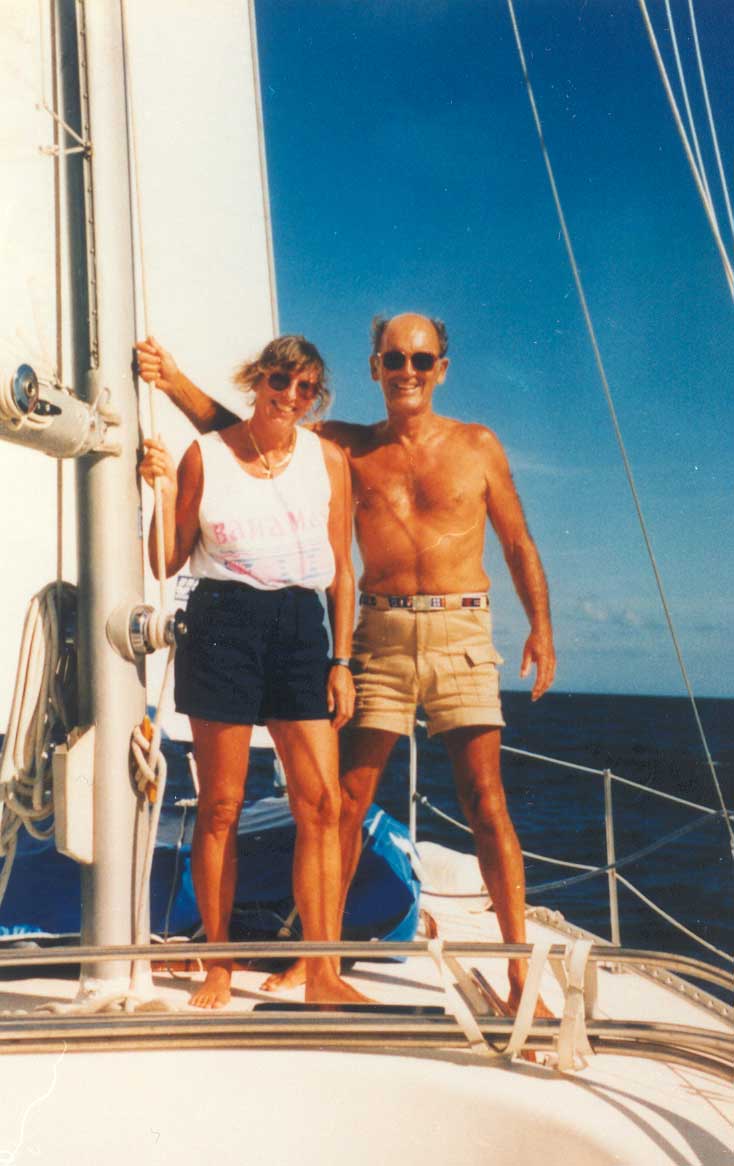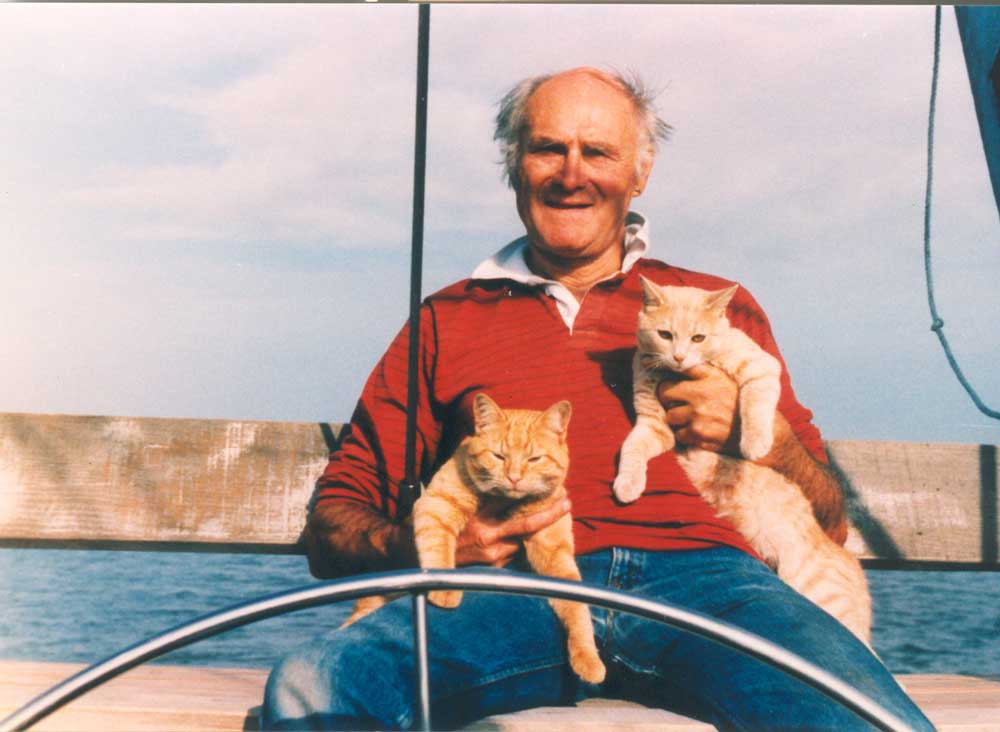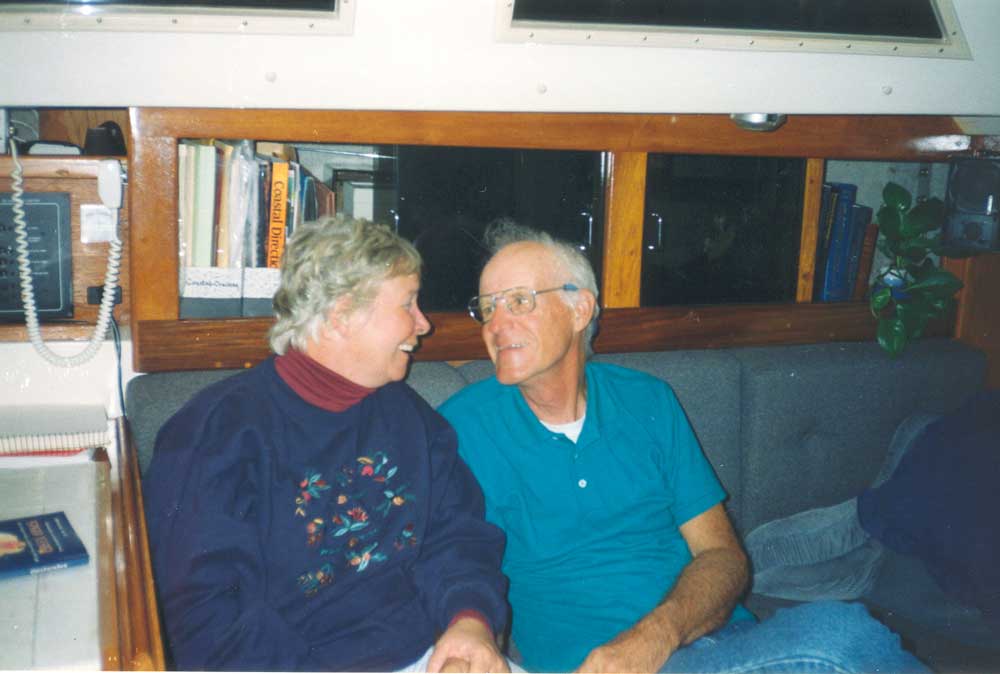A Celebration of Seniors on Sailboats
by Carolyn Corbett
Not only are more and more people sailing off into the sunset these days, many are sailing off in their sunset years. Vern and Hope Booth are a classic example. Throughout their ten years of cruising, they told their children not to worry about funerals for them. One day their 76-year-old father and 71-year-old mother would decide they’d had enough of life. They’d drink up the last of the rum, open the through-hulls, and go down with Muskoka. The kids could collect the insurance, knowing their parents had gone doing what they loved. Though Vern and Hope agree on most things, they began to picture the boat sinking with each of them bobbing to the surface saying “I thought you wanted to go!” Humor such as this is prevalent among senior sailors.
What motivates mature mariners to forego rocking chairs for bosun’s chair’s? “I
had to hustle and rush all my life. Now it’s time to smell the roses. I usually
spend two hours in the morning, over breakfast at anchor, just looking and
feeling.” At seventy, Bill Trilling doesn’t think of himself as a senior. Maybe
ten years from now he’ll be one, he wrote from an anchorage in Boqueron, Puerto
Rico.
The joys older folks find that outweigh the comforts of home are those embraced
by cruisers of every age: lack of external confinements, the challenges of
self-sufficiency, the simple lifestyle, and an unlimited supply of interesting
people who share a common bond. Not to mention freedom. Universally, these
people in their sixth and seventh decades of existence are seeking freedom.
 |
| Seventy-year-old Bill Trilling hopes his life will be one continuous beam reach up and down the island chain from St. Marten to Venezuela. |
The most significant change these seasoned sailors have observed over the years
is a gradual loss of this independence. They point to the ever-increasing number
of laws enacted by local and federal government - anchoring constraints, holding
tank restrictions, taxes directed specifically at boaters, licensing procedures
- more regulations every year. Do this. Don’t do that. Some feel smothered by
authorities looking over their shoulders.
What other changes have occured? The size of cruising boats has increased and
the age of their crews has plummeted. The median for both is in the mid-40’s
now, as young professionals become disenchanted with the rat race and take to
the water. These ex-ladder climbers are putting a whole lot of money into high
tech boats which feature comfort levels they’ve become used to ashore. Cost of
boats has risen, with push button sails and push button anchors showing up as
standard equipment.
A pivotal development has been the emergence of new technology. Old timers are
uneasy with the number of people who think that basics, such as dead reckoning
and compass fixes, are no longer necessary. They are concerned that youngsters
rely too much on the electronic gadgetry of GPS, SSB, electronic charts, and
notebook computers with weather FAX. Though state-of-the-art sailing makes life
easier, some seniors resist the allure of these new “toys,” believing failure to
exercise common sense and master fundamental skills endangers everyone on the
water.
 |
| Sixty-seven year old Warren Elliot anchors out 99% of the time and does all the necessary maintenance on his self-built 60’ steel cutter, Equaria. |
What of the dangers of cruising? While families experience legitimate concern at
the sight of Gramma and Grampa’s stern disappearing over the horizon, most
senior sailors are blessed with kin who adjust rather well to this twist on the
empty nest syndrome. Children and grandchildren support these “ancient mariners”
in having the times of their lives.
Primarily, it is peers who view these salty seniors as somewhat demented. Most
older sailors don’t consider themselbes exceptional, but stuck-in-the-mud types
back at home disagree, convinced they are sailing without a rudder. Non-boating
freinds shake their heads, thinking of the risks. Jack and Terry tried to
explain the appeal of their full time life aboard Packet Inn. After ten years,
they don’t try anymore.
Mellow friends accept the curious lifestyle, but are not interested in visiting
the boat or hearing the stories. Five minutes after they ask about cruising,
their eyes begin to glaze over and they change the subject. Chums who aren’t
fuddy-duddys find their offers to assist with crossings are often rejected. Most
seniors don’t need another person aboard and prefer not to be restricted by the
schedules of landlubbers.
Preparations for departing from the dock vary little from those undertaken by
cruisers who are twenty, thirty, or forty years their junior. Money, mail,
vehicles, insurance, whether to sell the house - these are issues crews of every
age must address.
Personal issues are not always dealt with as easily. Ann Jackson was not
prepared when her husband, whose health was not as good as it could have been,
decided to take early retirement and enjoy his last years on a sailboat. The
youngest of their eight children was still in high school, and Ann’s art gallery
was doing very well. Twelve years later, Basil is still enjoying his “last
years,” the kids are doing a splendid job of running the business, and the
family is managing fine without Mom and Pop.
Ann has taken pleasure in handing down worldly belongings. She’s free to pursue
her painting, she’s alive to see the kids appreciate their inheritance, and she
no longer has to worry about maintaining all that “stuff.”
Nevertheless, the yearning for creature comforts creeps up along with the years.
Seventy-four year old Basil has not made any modifications to their boat to
accommodate the aging process. The adjustments have been in their approach.
Anchoring and jib handling are done together now, with the hook dropped earlier
in the day, so they can relax over “drinkypoos.”
Ann and Basil have slowly made the transition from cruising toward more of a
liveaboard lifestyle. While they continue to make passages without additional
crew, when Quest. is surrounded by beautiful aqua water, with good boat buddies
nearby, they are content.
Not all oldsters opt for marinas, however. Many prefer small, quiet spots off
the beaten track. The younger crowd (those in their late 60’s) often tie up to a
dock only when there is no satisfactory anchorage of to perform necessary
maintenance.
Veteran sailors are attentive to upkeep, as concerned about the well-being of
their vessels as about themselves. Most continue to do their own yardwork,
though they admit their hulls seem to grow larger each year. Elma recently
worried over Bill going up their 62’ mast. Bill insists it had less to do with
age than with themess he would make on the foredeck if he fell.
Health matters are a consideration. Arthritis occurs following stressful
situations, and lasts a bit longer than in the past. Older cruisers face certain
physical limitations. While much of the short-term strength from younger days
can be relied upon in a pinch, stamina gradually deteriorates. Yet most
silver-haired sailors find health and age are not problems. These vintage
cruisers may be in the twilight of their days, but nobody’s turned the lights
out yet! They attribute their well-being to remaining active. Hobnobbing with
younger people keeps them on their toes both mentally and physically.
 |
| The joys of full time cruising for Jack and Terry Roberts? No lawn to mow, no snow to shovel, no worry about house repairs or taxes, plus the freedom to move if you don’t like your neighbors. |
Restructuring their approach to sailing helps to alleviate potential problems.
Weather is even more carefully watched than in earlier years. If the wind is up
or the forecast bad, ripe old crews stay put. Some invite friends aboard for
overnight passages. Others cruise in the company of a buddy boat, for
companionship and security.
Motorsailing or propulsion by iron jenny alone increase with age. Older folks
frequently sail under roller furling genoa alone, even when the breeze warrants
more. They’re not in a big hurry and it saves having to put another sail to bed
later on. It’s a shame, they say, that youth and energy are wasted on young
people!
John and Therese Roberts used to sail as much as possible. After all, they owned
a sailboat. But the Thorny Path taught them to be M&M cruisers - main and motor.
The engine is powered up in the morning to raise the anchor and idles throughout
the day. If wind and wave conditions are right, the Roberts sail. If not, they
shift Lesgo into gear and get going.
Modifications to make sailboats senior-friendly are few. Air conditioning, lazy
jacks, roller furling, refrigeration, and windlasses have been installed by
some. If these alterations are indicative of age, a lot of us on the water have
one foot in the grave. However, many seniors freely admit they will consider a
“terminal trawler” in the future, if it means the ability to remain on the
water.
High blood pressure, combined with the financial ramifications of paying for
boat repairs with the declining Canadian dollar, forced Jean and Raymonde
Perreault to call an end to their cruising. When her husband’s health
deteriorated, 67-year-old Raymonde sailed them the thirteen hundred nautical
miles from Puerto Rico to Bermuda to Newport, Rhode Island, where Jean-Ray was
placed on the market. Nevertheless, Taymonde reports that 72-year-old Jean is
still well enough to make passes at her and she calls him Tarzan!
After sailing full time for 16 years, Reade and Sarah Tompson sold Sarasan. A
friend said, “Now that you’ve sold that damn boat, guess you’ll stay home and
live like normal people.” What’s normal, they wonder? With gypsy blood still
flowing through their veins, they bought an RV. They haven’t stopped cruising.
They’re just doing it in a different vehicle.
How long will the others sail into the sunset of their golden years?
“As long as health permits.”
“Maybe 20 or 30 years, till I get real old and decrepit.”
“Until lost at sea or too old to raise the mainsail.”
John and Therese left on a two to four month shakedown cruise to the Bahamas and
forgot to come back. After nine years in the Caribbean, they finally returned to
U.S. waters, but don’t intend to give up cruising. The magic is still there.
Ann Jackson explained, “A boat is not a confined area. It’s the whole world.
Cruising gets your perspectives in the proper order. Love... life... people.
These are God’s creations for us to enjoy. And that’s what we’re doing.”
Carolyn Corbett is a freelance writer from Brainerd, MN.